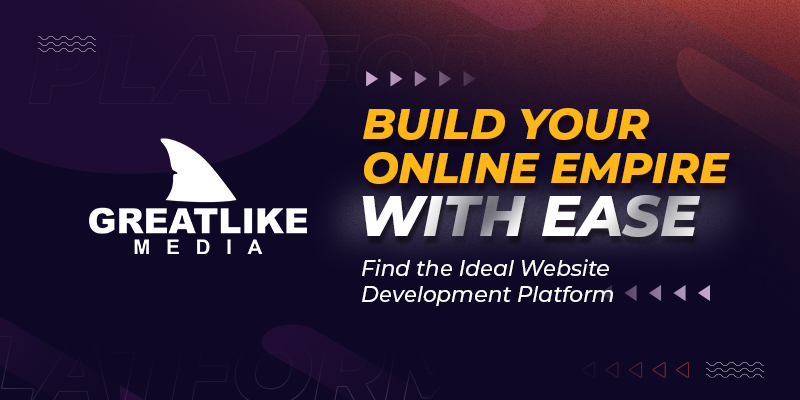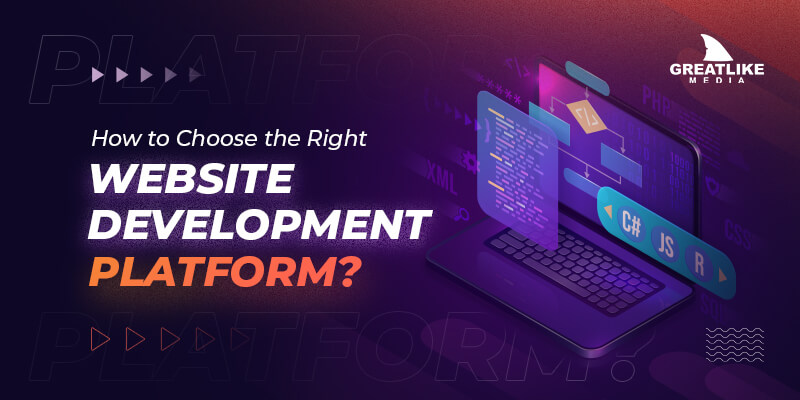
June 27, 2023
How to Choose the Right Website Development Platform?
Have you noticed how hassled the developer can be if they were to keep changing the development/deployment environments? The development complexities increase when your developer needs to create the code from scratch and build the components without apt infrastructure.
A development environment is core to developers’ efficiency and can assist them in accelerating the launch of applications. It provides the developer with a single and complete environment comprising the tools and technologies required to speed up development. It can help the developers create various applications, improve their deployment strategies and enhance the testing outcomes.
The web development platform is core to instilling the performance and managing the load. It can succumb to the extra load if the platform isn’t flexible or elastic. Choosing an appropriate platform is an important consideration for web app developers.
In an environment that comprises diverse application development platforms, it is important to make the right choice. We will discuss the top factors that can help you choose the appropriate platform for development.
How to Choose the Web Development Platform?
Choosing the appropriate website development platform to suit your application requirements is crucial. The choice of platform will help you enhance customer retention and scale your business.
1. Understanding your Website Needs

There are four pillars to the website requirements document. You need to define the people who will use the website, the need for a website, the things you want on the website and the scaling milestones. We will discuss each one in detail here.
-
Identifying the Purpose of Your Website
Why do you need a website for your business? This should be your first question, even before you delve deeper into the requirements of your website. Is it going to be your sales pitch? Do you want to increase lead generation through the website? Would it be your product purchase site?
Depending on the purpose, you can define the exact needs of the website. For instance, you will know what functionality the website requires. You can determine the features it will need.
-
Determining the Target Audience
The target audience is your website requirements document’s second most important part. When planning the website’s needs, you cannot ignore the people who will use it. How do you aim to engage them? Where will they use the website? Does your target market comprise a lot of people?
The devices, browsers and other details will help you plan the website better. You will know their usage behaviour and performance requirements. You would also know the load requirements for the website. This can help you plan the solution better.
-
Analyzing the Content Requirements
The content forms the third and most important part of the website. Depending on the purpose and audience, you need to identify the content (image, text, videos and other formats). When choosing the platform, content insights are important. Your content will decide whether you should use a CMS platform or others.
If you have a large amount of diverse content, CMS website solutions can help add and organize the content. Depending on the type of content, the quantity of content and other factors, you can select the CMS. Make sure you do complete justice to your content needs.
If you want a content-heavy website, you might consider using a CMS. Similarly, your platform needs will change if you want an image or product website. Depending on the content requirements, you can platform the platform.
-
Evaluating the Scalability and Future Needs
When choosing the web development platform, you must consider the scalability plans of your business. If you are planning to start small and move on to creating an enterprise-grade website, you must plan accordingly.
Not all platforms will be accommodating to the scalability needs posed by your business. Make sure to include these details when planning your website development.
2. Types of Website Development Platforms
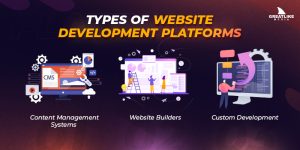
Knowing the different types of website platforms and their capabilities is equally important when choosing. Here we will discuss the types and when to use them. We will also identify the best website development platforms for your requirements.
-
Content Management Systems
The first option for any web developer is the content management systems for website development. This is typically used to handle content-heavy websites and create apt solutions. Using the CMS platforms, developers can easily add, organize and use the content required for the website.
It is easy to modify and reuse the content for the website using CMS solutions. Content management systems make it easier for developers to create web applications or solutions that can be accessed. It is fast and offers high-quality solutions.
A few examples of CMS include Drupal, WordPress, Joomla and Magento. With the CMS, you can create eCommerce, regular sales websites, and other web solutions.
| Pros | Cons |
| Accelerates time to market the solution | Can lower the site load speed |
| Limited backend coding needs | Not very scalable |
| In-built page builder available | High on maintenance |
| Excellent security features | |
| Inherent SEO features |
-
Website Builders
When you are choosing a web app development platform, website builders offer to be an excellent solution. With these builders, you can create websites faster and use their designers to devise apt solutions. You can access pre-built templates for website design that allows you to customize the applications to meet your requirements.
Using website builders is like using a low-code or no-code tool to build your application. You can create solutions with minimal effort using these builders. The developers can use the builders to express customizations and enhance the website’s ability.
Wix, Weebly, Shopify and WebFlow are some website builders that web app developers extensively use.
| Pros | Cons |
| Zero coding skills needed | Can be expensive |
| Package-based pricing solutions | Limited features and functionality |
| Accelerates development | A lack of SEO features is a possibility. |
| No learning curve |
-
Custom Development
The third type of solution would be opting for custom web application development. You can create the solution from the ground up and build something personalized to meet your website/business requirements.
You can align the web app development and even the application to meet your unique goals and requirements. You can consider all aspects, including future growth needs and evolution requirements, with the custom app development.
Hiring a web development agency is important to ensure smooth custom development and an apt solution for your business. As a top-notch Orange County web development service, Greatlike Media can extend custom application development aligned to your business goals and needs.
| Pros | Cons |
| Aligned to your business needs and goals | It can be slightly expensive |
| Flexible and scalable | It takes a long while to develop |
| Extensive security features available | |
| Complete ownership of the application |
3. The Top Factors Impacting Platform Choices
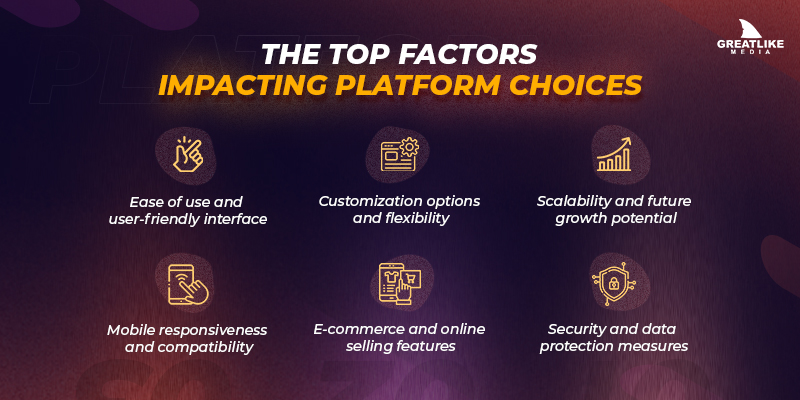
When planning website development, you must consider the different aspects that can accelerate your development and deployment. You must check for the platforms from the developer’s and business needs perspectives.
-
Ease of use and user-friendly interface
A developer should have a low learning curve when using a platform to build a website or web application. They should be able to handle the interface easily. The interface should be user-friendly and navigation intuitive. They shouldn’t need to connect with customer support to understand how the interface works.
-
Customization options and flexibility
Whether creating a custom application or adding a few personalization elements, choosing a platform that can enable customizations should be important. If the platform is too rigid or the framework doesn’t support adding elements, you cannot include components important to the business.
-
Scalability and future growth potential
Say you are choosing a CMS platform for your current requirements. However, the platform doesn’t support your growth requirements. This can hamper your website scalability and put a full stop to your business plans.
Choosing a future-driven website platform that can support your growth and scalability requirements is equally important. Whether planning a website builder, CMS or custom solution, make room for future needs.
-
Mobile responsiveness and compatibility
Your customers will not access the website or application on the desktop or tablet alone. They may be accessing it on their smaller screens. Is your website ready for these platforms? Can you extend a similar experience across all the devices? These questions can help you plan the website for all devices and browsers. This will help improve your website’s reach and allow developers to indulge in mobile-friendly website development.
-
SEO-friendliness and optimization capabilities
You should opt for SEO-friendly website design and development. However, adding it to the platform or including these aspects can take some time. Several platforms serve you with in-built SEO features and optimization features. You can choose to use them to build your website or application.
-
E-commerce and online selling features
If you are planning a website for your eCommerce business, you need to ensure there are in-app payments, product features, and other selling points. You will get brownie points if you include the right things on the website.
That’s why you need to start with a platform that can help you enhance the eCommerce features. It should be more eCommerce specific. For example, choosing Shopify as the website builder will be a good choice.
-
Security and data protection measures
When choosing the website development platform, you should consider its security measures. Having an SSL certification is an essential requirement. However, there are other things too that you might want to include. Data encryption, transfer encryption, storage security and compliances. Make sure you are well aware of the security measures they have taken.
4. Technical Requirements
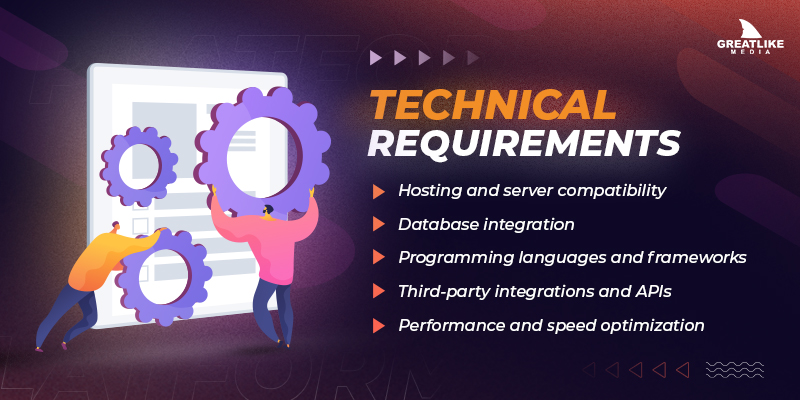
The most important part of choosing the development platform is the technical requirements. You need to consider all aspects before planning the development.
-
Hosting and server compatibility
As a business owner, you must know the number of people visiting your website. An approximate load count is important. Hosting and server compatibility are pivotal in ensuring smooth performance, excellent access and exceptional security for the business. You can choose to go with public hosting, private hosting or other formats. You can also choose cloud hosting depending on the storage and other requirements.
-
Database integration
The database is an integral part of the application. Most of the information requested in the app will be stored in the database. The application’s front and back ends will communicate through the database. The queries will be passed through the database. Choosing a platform that integrates with the database you need quickly is important.
Database integration will help consider data movement, safety, and other aspects.
-
Programming languages and frameworks
When choosing an app development platform, you must check for the programming language support you will get. Will it support HTML, JavaScript and other basic programming languages you need to use? Can it work with other web development frameworks that you are currently using? This is an important part of making the choice.
-
Third-party integrations and APIs
The developer can’t introduce all the features required for the platform in a single go. You will notice that certain features cannot be developed from scratch. Integrating with the choicest APIs and third-party applications can help add the features without using the resources. You must choose a platform that can integrate with third-party applications and APIs easily.
-
Performance and speed optimization
Can you use the platform to optimize the performance of the application? Can you tune it to match the optimization needs? When you have specific optimization and load requirements, you must choose a platform accordingly. It will help you plan your solutions in a better way.
5. Budget Considerations

Web app builders can prove to be expensive. At the same time, web application development platforms may not be entirely cost-effective. It would help if you considered everything while estimating the budget plan for the application. It will help you provide an apt solution for your business.
-
Evaluating upfront costs
The first step is to calculate the actual cost of building a website. This would include calculating the platform cost, the resource cost, and hosting costs. It would help if you started by identifying the different elements and then adding the cost against them.
For instance, if there is a part where you hire two testers for the application. You will calculate the number of hours they are likely to spend. Now, add the cost per hour for each resource. With this data, you can get an approximate cost for the resources. Similarly, you must add the cost of the platform hosting per year or however, the particular company calculates.
As a leading Orange County web design agency, we help determine the upfront costs and estimate the total value of application development. You can consult with our team to discuss the total cost of mobile-friendly website development.
-
Factoring in ongoing maintenance and updates
Once you have calculated the approximate cost or the fixed payments you must make for website development, start working on maintenance and support costs. This will also need some thinking.
You must define this estimate’s periodic maintenance, support resource costs and other parts. You will arrive at a final cost once you complete all the necessary calculations.
-
Comparing pricing models (one-time payment, subscription, freemium)
When choosing the platform, you might come across various pricing models. This would include one-time payment, premium+free or subscription models. Before committing to the model, you must think through the best choice for your business.
Let’s look at the differences in each of the pricing models.
1. One-time Payment: The features, pricing, time period and tools available are fixed in this model. It is akin to an off-the-shelf solution for platform selection.
2. Subscription Model: You can pay for the features and tools that you plan to use with this model. It will be a pay-as-you-go model where you can add or remove features as needed.
3. Freemium: The basic tool is available for free. However, if you want to add features that can enhance app development, you must purchase the premium version.
6. User Experience and Design
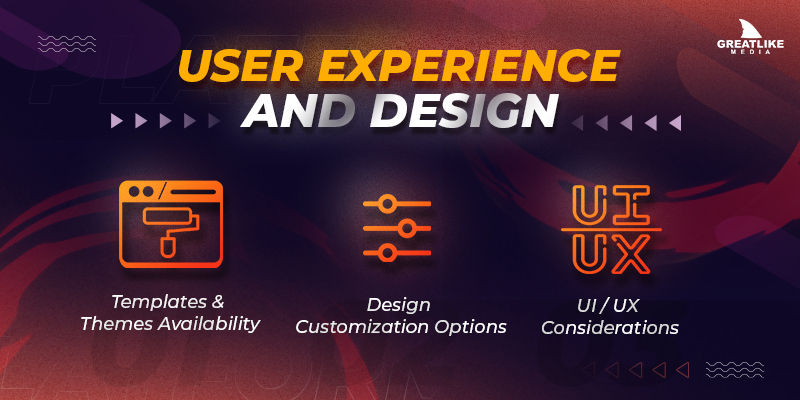
The platform choice also depends on the design abilities and the developer’s experience while using it. If the developer doesn’t enjoy using the platform or has a few limitations, you might notice that it doesn’t fulfil your web app development needs.
-
Templates and themes availability
Look for the in-built templates that will help you plan your website. You should ensure there are a good number of templates that can support your web developer. The ready-to-use themes can accelerate development and enhance the design. Choose a platform that offers diverse choices.
-
Design customization options
When you are choosing a platform, customization options are equally important. You want something that extends the ease of customization and the necessary opportunities. You might face issues if the platform is rigid and doesn’t help with customizations.
-
User interface (UI) and user experience (UX) considerations
Lastly, look at the platform from a developer’s standpoint. You need to make sure the interface is developer friendly. Your developer must be able to create a masterpiece with the platform and unleash the best experiences.
7. Support and Documentation
Platform documentation is vital to ensure you aren’t stuck while developing. Look for a platform that extends complete support and always-available documentation that can help you build the solution.
-
Availability of customer support
The customer support of your platform is an important consideration. You may need help accessing the tools, registering your project and other aspects anytime. A good customer support desk will help you resolve the issues to be on time with your project.
-
Online resources, tutorials, and documentation
The next thing to look for would be the development platform’s help tutorials and knowledge base. You must ensure you have all the necessary resources to make working on the platform easy. If you have a query and want to solve it on your own, these resources can help.
-
Community forums and user groups
Community support is an important consideration when choosing a website development service. The community or support groups can help you debug the code, determine the solution or help with logic whenever you are stuck. They would also give you pre-built templates and components that you can use in your application.
Frequently Asked Questions
Let’s answer a few frequently asked questions about choosing a development platform.
1. How do I choose the technology for the website or web app requirements?
Look for the following when planning the tech stack for your website project:
- The scope of work
- The time to market the application
- Specifications for the developer
- Budget
- Security and scalability needs
2. What are the three types of web development you should know?
You must know the three types of web development before selecting the platform- frontend, backend and full stack development.
3. How much does a good Orange County website design services cost?
The cost of a custom web design service starts at $10k. An agency can charge anywhere between $15k and $25k for a simple custom web application service.
4. What type of methodology do we follow as the website development service in Orange County?
We have been following the Agile methodology to deliver efficient solutions in a quicker fashion. We take pride in our test-driven approach, which allows us to test an application faster and remove the bugs before anyone notices.
Conclusion
Platform selection is an integral part of your web development project. You must choose a usable platform that can help accelerate development and matches your business goals. When selecting the platform, you should also consider the budget and target market for the website or web application.
Greatlike Media is a leading custom web design and software development company. We offer extensive website development services in Orange County to meet your business requirements. Connect with us with your idea and vision. We will translate them into exciting solutions.
 Back to main posts
Back to main posts
